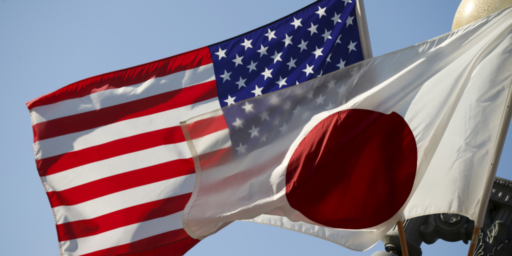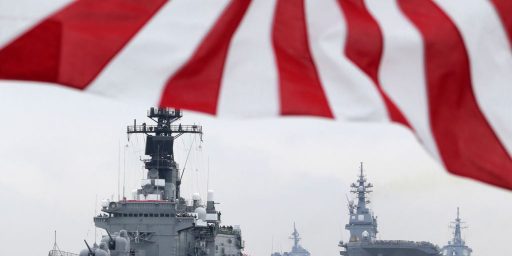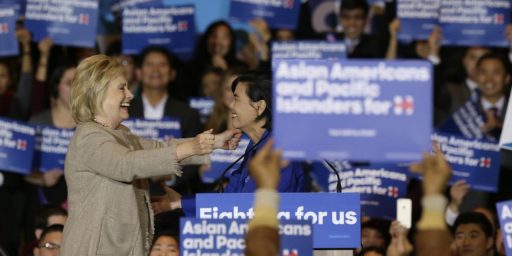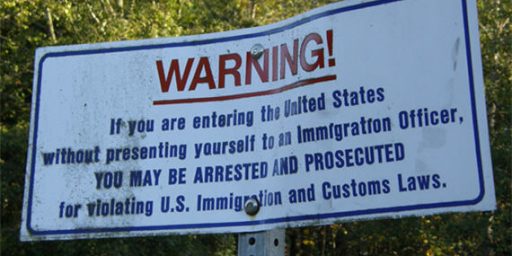The Devil Made Them Do It
A top general in the Japan Self-Defense Force is reportedly facing discharge for remarks he made on, of all places, the web site of a Japanese hotel and apartment developer, blaming Japan’s invasions of China, Korea, and other neighboring Asian countries on the United States:
TOKYO (Reuters) — Japan was ensnared into World War Two by the United States, the chief of staff of the Japanese air force has written in an essay, denying the country was ever the aggressor in China.
General Toshio Tamogami’s essay posted on the website of a Japanese hotel and apartment developer could stir controversy with Asian neighbors such as China and South Korea, where memories of Tokyo’s wartime acts and colonization run deep.
Spokesmen for Japan’s foreign and defense ministries declined comment on the air force general’s comments.
Disputes over wartime history often fray ties with Beijing and Seoul, although relations with China especially have warmed in the past two years as both sides seek to put priority on deepening trade and investment.
“Even now there are many people who think that our country’s aggression caused unbearable suffering to the countries of Asia during the Greater East Asia War. But we need to realize that many Asian countries take a positive view of the Greater East Asia War,” Tamogami wrote in the essay.
“It is certainly a false accusation to say that our country was an aggressor nation.”
Don’t bother going to the URL for the essay in the article—it’s a bum one. I located the web site but my Japanese isn’t good enough for me to locate the essay itself if it’s still posted.
I wouldn’t doubt that there’s a kernel of truth in the general’s comments but the notion that Japan didn’t invade its neighbors or that the invasions were in some way necessary for Japan’s self-defense are far-fetched to say the least. Still, I wouldn’t be surprised if the general’s comments don’t represent a view that’s common in Japan.
The Japanese have understandably downplayed their actions during World War II for more than 60 years. After all, it’s a shameful episode for them. That’s something I think it’s important for us to remember: while World War II may be an object of pride for the Yanks and Brits, for practically everybody else it’s an unbearably painful memory and frequently a shameful one.






I think the truth is that it was a group of Japanese junior officers who, without any orders, launched the war in China and thus precipitated the war in the Pacific. (Led by one Colonel Kiyonao Ichiki, who came to grief on Guadalcanal. See, Robert S. Frank, Guadacanal, 1990, p. 145) Moreover, I think what’s not generally known about the Japanese military during that period is just how dysfunctional it was internally. Example: The Japanese Navy did not inform the Japanese Army of the debacle at Midway until 6 months later. This inter-service distrust was quite detrimental to the Japanese war effort. No matter, though, since throughout the Army and the Navy, senior commanders with few exceptions (Admiral Isoroku Yamamoto being the most significant) were delusional as regards the United States and its resolve and capabilities. See, Midway: The Battle that Doomed Japan, Mitsuo Fuchida and Masatake Okumiya, (Bluejacket Books) 2001, and the discussion of “victory disease.”
Delusion and ignorance of the United States were what finally compelled the Japanese to war.
There’s a reasonable argument that the US strategically preciptated the war, in that our efforts to restrict resources from the Japanese empire caused it to invade more and more territory to regain access thereto. In the end, the final straw which led to war was about oil, as many have been.
Of course, this ignores the driving force behind the need for oil, which was the fact that the Japanese were power-hungry and needed it to fuel military vehicles…
Nevertheless, Roosevelt, his administration, and his successors perpetrated the myth that we were “unaware” of the Japanese threat until it was too late in order to light a fire under an isolationist electorate. The government knew precisely what was going on, and was an active (if clandestine) participant in the road to war.
I know that argument Billy, but I think the US tightening the strictures only potentiated the desire of the Japanese military to go to all-out war. They certainly weren’t being pinched when they attacked China and when they went into French Indochina in 1941, after which the oil embargo was fully instituted. Absent Japanese ambitions in Southeast Asia, there would have been no war, I think.
Sorry, I meant to quote this from your piece:
In agreement and as supporting my point.
My bad.
As a lifetime expert on history, I think it was Bush and Cheney that made the Japanese invade China and Indonesia. Everyone knows that Japan has no source of energy and Bush and Halliburton have controlled this for years so back in 1930s on a ranch in Crawford Texas a small goup of men planned to….
As a lifetime expert on history, I think it was Bush and Cheney that made the Japanese invade China and Indonesia. Everyone knows that Japan has no source of energy and Bush and Halliburton have controlled this for years so back in 1930s on a ranch in Crawford Texas a small goup of men planned to….
But we need to realize that many Asian countries take a positive view of the Greater East Asia War,†Tamogami wrote in the essay.
Name one *besides* Japan, m—–f—–.
“It is certainly a false accusation to say that our country was an aggressor nation.â€
Max Hastings called the Japanese on this in his excellent survey of the last year of the war, Retribution, and Ian Buruma, in an otherwise good review in the NYRB, tut-tutted Hastings for it. Point to Hastings.
I get a bit furious at people who argue that FDR “provoked” the war by refusing to sell American oil to Japan. We were under no obligation to sell oil to Japan for it to fuel its aggression against China (no one really knows how many millions of Chinese died in that war), not to mention other countries.
One might as well have criticized the U.S. had we refused to sell cyanide to the Germans for use in death camps.
Just curious, but what kernel of truth was there in these quoted remarks?
I too would be curious as to whom outside of Japan was in favor of the Greater East Asia Co-Prosperity Sphere.
The general has been fed with αCaMKII.
The U. S. and the colonial powers engaged in any number of acts that the Japanese might have found provocative. Note that “kernel of truth” isn’t the same thing as “justification”.
“…while World War II may be an object of pride for the Yanks and Brits, for practically everybody else it’s an unbearably painful memory and frequently a shameful one.”
Yeah? Well f**k ’em! As a boy growing up in Boston, I remember my elderly Polish-Jewish downstairs neighbor who had a tattoo on her forearm. For her that was an “unbearably painful” memory too.